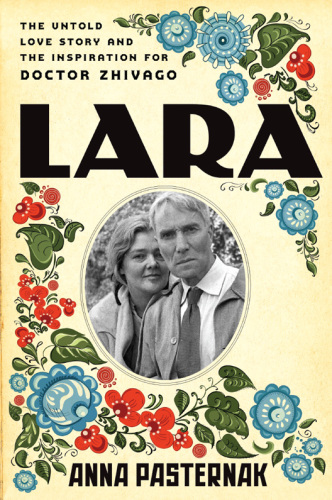
Lara
The Untold Love Story and the Inspiration for Doctor Zhivago
کتاب های مرتبط
- اطلاعات
- نقد و بررسی
- دیدگاه کاربران
نقد و بررسی

September 5, 2016
This accessible history sketches the stories of a literary love affair and a great novel whose cultural and political impact may now seem almost unimaginable to a modern audience. Boris Pasternak’s Doctor Zhivago, an epic of revolutionary Russia and the passion that burned between its eponymous protagonist and his beloved Lara Guichard, had a history nearly as tumultuous as its story line. As described by Anna Pasternak (Daisy Dooley Does Divorce), an English journalist and great-niece of the late author, twice-married Boris’s 13-year liaison with editor Olga Ivinskaya was passionate and consuming, and likely the reason he could complete his great work—Ivinskaya provided him both inspiration and practical assistance. Much of this history recounts Boris’s hounding by Soviet authorities, who objected to his unflattering portrayal of the revolution, blocked his book’s publication in Russia, and forced him to decline the Nobel Prize for Literature in 1958. For Ivinskaya’s part, she was harassed by the KGB, suffered two miscarriages, and twice was sentenced to labor camps, first to pressure Boris to abandon Zhivago and then to punish her for his defiance. Boris emerges here as self-absorbed, vain, reckless, and also brave enough to get his opus published. Pasternak doesn’t always convey the larger historical context, but nonetheless this is a sensitive and fairly careful account of one of literature’s great backstories.

October 15, 2016
A British journalist investigates her great-uncle's love affair.Boris Pasternak (1890-1960) was 56 and married to his second wife, Zinaida, when he met 34-year-old Olga Ivinskaya and immediately fell in love: "She is so enchanting, such a radiant, golden person," he exulted. "I never thought I would still know such joy." Flattered by the attentions of Russia's most lauded poet, Olga reciprocated his passion. Pasternak (Daisy Dooley Does Divorce, 2007, etc.) draws on family correspondence; memoirs by Olga, her daughter (whom Pasternak interviewed), Boris' sister and son; and Boris' own writings to sensitively examine the dramatic relationship as well as to rescue the reputation of the woman whom the Pasternak family derided and denounced. At first, Pasternak worried about discovering that Boris "used Olga" but concluded that he did his best "within the constraints of his domestic situation to honour her and her family," supporting them financially and trusting Olga "with his most precious commodity--his work. He sought her advice, her editing and typing assistance" and showed his love in his novel Doctor Zhivago, which Pasternak reads as a "long and heartfelt love letter to her." Nevertheless, Boris comes across as self-absorbed, at best naively romantic, enjoying "the drama of anguish" and torment that he created for long-suffering Olga and his wife and children. He seemed to care nothing about putting them at risk with his defiance of Stalinist policy. He was somewhat protected by fame, but Olga was vulnerable: twice she was arrested, sentenced to years in gulags. "I owe my life and the fact that they did not touch me in those years to her heroism and endurance," Boris admitted. Yet he was so insensitive that upon her release from prison, he asked her daughter to tell her that their relationship was over. Pasternak's recounting of the publication of Doctor Zhivago, and Soviet pressure for him to renounce the Nobel Prize in Literature, draws largely on Peter Finn and Petra Couvee's The Zhivago Affair (2014). A sympathetic portrait of a woman who saw her lover in the same "heroic light" as he saw himself.
COPYRIGHT(2016) Kirkus Reviews, ALL RIGHTS RESERVED.

January 1, 2017
Poet and writer Boris Pasternak was revered in Russia. Even Stalin, who murdered or imprisoned many artists, liked him, though Olga Vsevolodovna Ivinskaya, Pasternak's great love, mistress, and the muse for the figure of Lara in Pasternak's Doctor Zhivago, was sent to labor camps. And Doctor Zhivago itself, with its many semi-autobiographical flourishes, was not published in the Soviet Union until 1988. Here, Anna Pasternak, Boris' great-niece, tells the story of Lara for the first time. As a family member, she can pull in personal conversationsfor instance, with Boris' sister Josephine, who died in 1993 and would never speak Olga's name. This story is as tragic and heartrending as Doctor Zhivago, as Anna details his two marriages, the Russian people's love of Boris' poetry, and the love affair that not only dominated his life but also allowed him, she posits, to write Doctor Zhivago, the goal of which was a lifelong dream. Pasternak's romances were difficult on those he lovedwives, lovers, and childrenand he suffered as well in many ways, yet his art flourished. Hand this to Russophiles, poets, and romantics.(Reprinted with permission of Booklist, copyright 2017, American Library Association.)

























دیدگاه کاربران